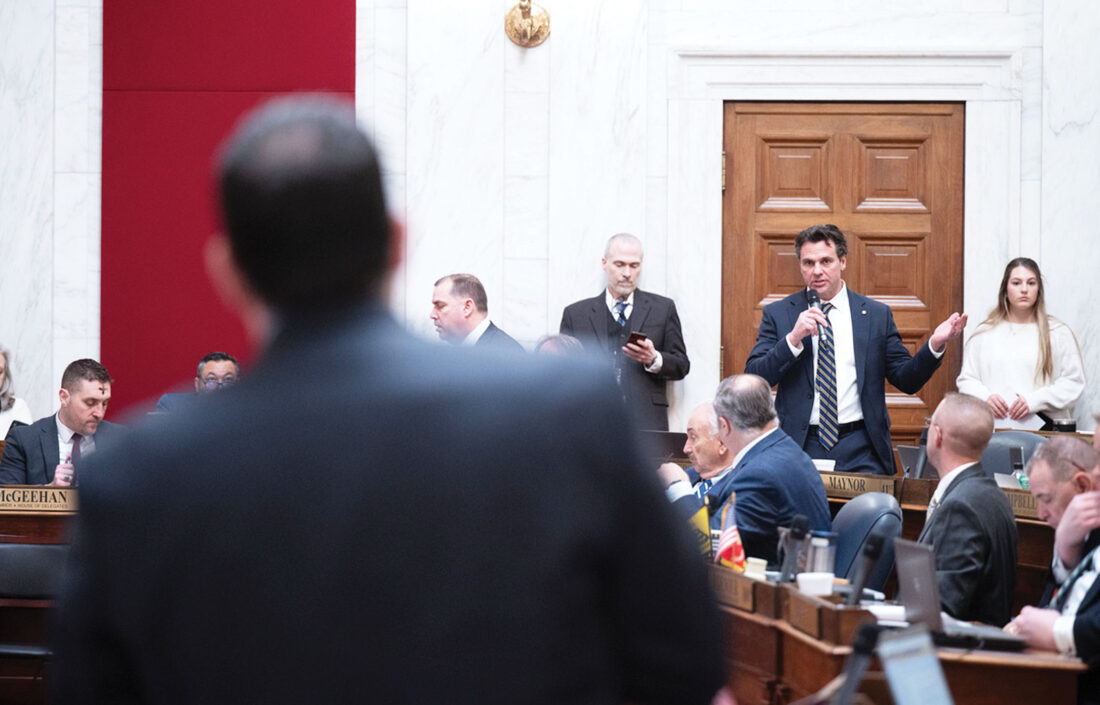West Virginia House passes bill dealing with fentanyl sentencing guidelines
Senate committee approves measure to make drug test strips, Narcan more expensive

House Judiciary Committee Chairman JB Akers takes a question from Del. Mike Pushkin during a discussion Wednesday of House Bill 2437, clarification of penalties for offenses involving fentanyl. (Photo courtesy of WV Legislative Photography)
CHARLESTON — The West Virginia House of Delegates passed a bill Wednesday to enhance penalties for individuals involved in the distribution of controlled substances containing fentanyl. The House passed House Bill 2437, clarification of penalties for offenses involving fentanyl, in a 91-7 vote Wednesday morning, sending the bill to the state Senate. HB 2437 aims to clarify and enhance the sentencing for crimes involving drugs laced with fentanyl, a powerful synthetic opioid more potent than most prescription opioids. The bill modifies existing State Code to remove the requirement of “knowing” that a controlled substance contains fentanyl for a sentencing enhancement to apply in cases of manufacturing, delivering, or possessing with intent to manufacture or deliver a controlled substance. “Individuals who distribute illegal controlled substances may additionally be guilty or have a sentencing enhancement if it’s found that these illegal substances contain fentanyl,” said House Judiciary Committee Chairman JB Akers, R-Kanawha. “This section only takes out two words in existing code, which are ‘knowing that’ and replaces it with the word ‘when.'” According to State Code, a person convicted under these provisions is guilty of a felony and can be sentenced between one and 15 years in prison and/or fined up to $25,000. If it is found that fentanyl was used in combination with another controlled substance, minimal jail time could increase to not less than three years and/or a maximum $50,000 fine. “If the controlled substance is later found to contain fentanyl, then the sentencing enhancement would apply,” Akers said. The bill generated debate on whether it constitutes sound policy, particularly concerning its potential impact on individuals with substance use disorders and the effectiveness of deterrence. “I think we’re really over-complicating it,” said Del. Mike Pushkin, D-Kanawha. “The intent of the bill is good. And we all came up here because we want to do something about this scourge of fentanyl, but this hasn’t worked…The politics of it might be good, but this is not good policy.” “If you’re knowingly selling fentanyl, you should suffer the consequences. You should suffer in the enhancement,” said Del. Hollis Lewis, D-Kanawha. “But my fear is that because this is a little bit overly broad. We’re going to end up punishing individuals who suffer from a substance use disorder and we’re going to fill our jails up and we’re not going to adequately address the problem.” Fentanyl is often mixed in with other illicit drugs, such as heroin, marijuana, and even prescription drugs. According to the U.S. Drug Enforcement Agency, 42% of pills tested for fentanyl contained at least 2 milligrams of fentanyl, which is considered a lethal amount of fentanyl. According to the state Office of Drug Control Policy’s Data Dashboard, fentanyl makes up the majority of West Virginia county-level fatal overdoses, with 1,134 fentanyl overdoses recorded in 2021. According to the U.S. Centers for Disease Control, West Virginia’s drug overdose death rate was 80.9 people per 100,000 residents – the highest death rate in the nation in 2022. The Department of Human Services reported in February that West Virginia continues to see decreases in overdose deaths from a peak during the COVID-19 pandemic, reporting a 41.7% decrease from January to August 2024 compared to the same period in 2023. West Virginia had a 32.8% decline in year-over-year overdose deaths for a 12-month period ending in August 2024, surpassing the national average. Closing debate on the bill, Akers argued that was no excuse for anyone using or distributing illegal drugs to not use test strips to determine whether their products are laced with fentanyl before selling or distributing. “If you want to deal drugs, see if your drugs contain fentanyl before you kill someone,” Akers said. “If you aren’t willing to do that, then the sentencing enhancement should apply to you. “A holistic approach to this is necessary. Substance abuse treatment is necessary, but deterrence also works,” Akers continued. “This is a deterrence bill and it’s a responsibility bill. If you’re going to sell illegal drugs, check to see…whether they contain fentanyl or not before you kill someone.” Meanwhile on the other side of the State Capitol Building, the state Senate Select Committee on Substance Use Disorder and Mental Health considered a bill to make drug testing strips more expensive. Senate Bill 109 would establish the Neighborhood Assistance and Rejuvenation Compact Act, creating a rewards program for citizens who provide information leading to arrests and convictions related to drug offenses. The program, which would be supervised by the West Virginia State Police, would be funded through a one cent excise tax on opioid antagonists and drug test strips. Opioid antagonists include naloxone (Narcan), naltrexone, nalmefene, and methylnaltrexone. These are used, often as a nasal spray, to revive a person experiencing an opioid overdose. Many non-profit organizations distribute opioid antagonists to first responders, health care professionals, schools, and the public at large. “The reason I went after Narcan and fentanyl test strips is the people – both the traffickers and the users – are the reason we have to do this in the first place,” said state Sen. Eric Tarr, R-Putnam, the lead sponsor of the bill. “If you buy gas, there is a tax on it because you’re using the roads…They’re certainly not paying taxes on the drugs they are using, but they are taxing and putting a demand on our system.” State Sen. Tom Takubo, R-Kanawha, opposed the bill, arguing that the program would not raise much income since nonprofits are the largest purchasers of Narcan, and that it would make opioid antagonists and test trips harder to come by and more expensive. “I think it sends a message when we’re trying to tackle the people who are coming in and bringing the drugs that are killing West Virginians at the expense of trying to save those who are already afflicted with this,” said Takubo, a physician. “It looks like we’re sending a message that we’re going to take it off the skins of the backs of those on death’s doorstep to pay for something on the front end. To me, that just sends a bad message.” Steven Allen Adams can be reached at sadams@newsandsentinel.com





